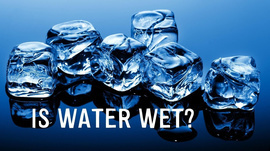Enjoy being online again!
Welcome to the community of good people who base their values on evidence and appreciate civil discourse - the social network you will enjoy.Create your free account
16 comments
Feel free to reply to any comment by clicking the "Reply" button.Is water wet?
Here is the answer.
Ryo1:
From an impartial expert: Dr. Diana Glick, professor and director of the Undergraduate Studies Department of Chemistry at Georgetown University.
Glick answers the question how she thinks the scientific world would address it: “Technically,” she says, “water isn’t wet because water is a wetting agent.”
Glick says people can decide for themselves which definition of “wet” they prefer, but for scientific purposes, water is not wet.
Do dictionaries say water is wet?
According to Oxford Languages, the dictionary company which provides Google’s featured definitions of words, wet can be defined as, “Covered or saturated with water or another liquid.”
According to Merriam-Webster, wet is defined as, “consisting of, containing, covered with or soaked with liquid (such as water).”
Depending on which definition you prefer, you might be able to defend either answer to the question, but if you trust the expert, the answer is a firm no.
To those who argue whether water can be saturated with itself, Glick says, “People would normally talk about saturation in terms of a mixture. Something is saturated with something else. If something is saturated with itself, it’s 100% that thing. Saturation becomes a moot point.”
Water’s interactions with itself are actually different from its interactions with the objects and substances it wets. “Water with water has a cohesive interaction,” explains Glick, “and if water is attracted to something else, then that’s called adhesive. This concept of wetting is actually, to a scientist, the adhesive side.”
Because water has a cohesive interaction with itself, says Glick, it doesn’t wet itself. Instead, it forms hydrogen bonds between molecules to stick together.
There you have it! And thank you all for your inputs. Cheers!
The wetness of an object is actually not a property of the object itself, but refers to the presence (and amount) of liquid on, or absorbed by, the object, for example a wet sponge. Therefore, similar to viscosity, I classify this as a liquid material property.
[sciencedirect.com] › pii
Tactual perception of liquid material properties - ScienceDirect.com
And, another source.
So, in this context and by the definition in the dictionary, wetness is a property that arises from the interaction between a liquid and a solid surface. In other words, when water touches a surface, we say that the surface is wet.
[clearlyfiltered.com] › articles
Is Water Wet? | Fluoride Filter Water Bottles & Pitchers to Remove ...
Ryo1:
So, how about if you're not touching water, which is in contact with whatever it is, to feel its wetness? Say water infiltrates into a fabric and the fabric is dripping with water. we will instantly assume that the fabric is wet, without touching it. Is that because the perception of water + wetness is deeply embedded in our brains as an obvious fact (which now doesn't seem like an obvious fact)?
I think for something to be considered wet, the liquid that's introduced needs to change the quality of it in some appreciable way. Adding water to a piece of paper changes it drastically. A towel, a little less. If you had marble around you pool and someone splashed it with a cannonball, the water would drastically change it by lowering the coefficient of friction. Adding water to water doesn't seem to change it in any way.
And now I have a question for you Mister Ryo. Is there water at the bottom of the ocean? Before you may answer that, please keep in mind what it is exactly I was asking there, and not what you may have perceived me to have asked.
Just curious as to how you would answer, but you don't have to answer if you don't wish to though.
Ryo1:
That's also a tricky question. I've gotta think!
No. By definition the word "wet" simply describes what happens when a liquid and a solid come into contact with each other, in this case the saturation of the solid by the liquid. In other words, wet describes the actual state and or result(s) after an interaction, and not the object or entity itself.
What we humans would call/label as wet is merely a perception, and not so much objective fact. Scientifically speaking, wetness is defined as the ability of a liquid to adhere to (cover) something solid, and that quality is measurable.
Take for example a piece of wood and fire... if the fire comes into contact with the wood, the wood will burn. Likewise, if water comes into contact with the wood, the wood will become wet. If we are to believe water is wet, are we also to believe the fire itself is burnt?
Hope that answered your query.
Ryo1:
My understanding is similar to yours. If 'wetness' is referred to as the interaction between a liquid and a solid object, water is not wet, but if 'wetness' is regarded as a sensation, water is wet.
Ryo1:
Having said that, because water essentially needs to make contact with a solid surface to impart a wet feeling doesn't prove that water is dry in the first place, i.e., it can be already wet itself.
Enjoy being online again!
Welcome to the community of good people who base their values on evidence and appreciate civil discourse - the social network you will enjoy.Create your free account
Share this post
Categories
Agnostic does not evaluate or guarantee the accuracy of any content. Read full disclaimer.










 KISS...
KISS...